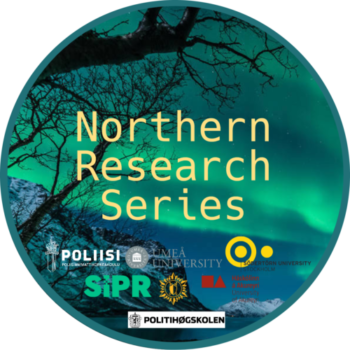SIPR Newsletter Sign Up
You will be added to our mailing list to keep you updated with future events and activities from the Scottish Institute for Policing Research

Speaker:
Shane MacGiollabhui
Maurice Mulvenna
Ray Bond
Callum Craig
This project examines how, and under what conditions, the Police Service of Northern Ireland uses forensic services in a way that leads to more effective, and efficient, investigations into criminal offences. In this presentation, we provide an overview of the projects design, research questions, and a preliminary examination of the data. The research team includes formal cooperation from the PSNI, as well as the Department of Justice NI, and the Strategic Investment Board of NI.
Shane Mac Giollabhuí is a Lecturer in Criminology at Ulster University, Belfast, in Northern Ireland. His research and teaching focuses on the culture and organization of liberation movements, political parties, and police forces. His research has been published in journals across the social sciences, including African Affairs, Democratization, Party Politics, The British Journal of Criminology, Qualitative Research, and in peer-reviewed books and edited volumes from Palgrave and Routledge.
Callum Craig is a PhD candidate in Political Science at Trinity College Dublin. His research focuses on political communication and the use of extreme narratives by political and institutional elites.
Maurice Mulvenna is Professor of Computer Science at Ulster University. Maurice’s research areas include artificial intelligence; data analytics; mental health and wellbeing data analysis; and assistive technologies. His most recent research focuses on working in partnership with mental health organisations, using artificial intelligence to uncover useful behavioural patterns in anonymised call and event data pertaining to crisis helplines, chatlines and suicidal behaviour in public places.
Raymond Bond is Professor of Human Computer Systems at Ulster University. Before academia, he worked in the web industry and later held Research Associate positions in the subject areas of Connected Health and Computerised Electrocardiography. He also coordinated the Computing and Engineering Professional Education Centre for Northern Ireland (CEPEC-NI) where he managed computing science related outreach activities and summer schools. Raymond has research interests within human-computer systems which has mainly included applications of biomedical and healthcare informatics (digital health).
 Shane MacGiollabhui
Speaker
Shane MacGiollabhui
Speaker
Dr Shane Mac Giollabhuí is a Lecturer in Politics and Postgraduate Tutor at the School of Applied Social and Policy Sciences at Ulster University. He writes about political parties and democracy in Africa and police surveillance in the United Kingdom. His research has appeared in African Affairs, Party Politics, Democratization, the British Journal of Criminology, and Qualitative Research. Invisible Policing: Inside the World of Covert Surveillance, co-authored with Dr Bethan Loftus (University of Manchester) and Professor Benjamin Goold (University of British Columbia) will be published by Routledge in 2018. In previous posts, he has conducted postdoctoral research at the Centre for Criminology, University of Oxford (2009–11), lectured in African politics at the Department of Politics and IR, in associated with St Peter’s College, at the University of Oxford (2011–15), and at the Department of Political Science, Trinity College Dublin (2015–17). If you are interested in conducting PhD research under his supervision, please get in touch. He welcomes, in particular, candidates with projects on any aspect of the police and policing in sub-Saharan Africa.
 Maurice Mulvenna
Speaker
Maurice Mulvenna
Speaker
Maurice Mulvenna BSc. (Hons), PgCert, MPhil, PhD, FHEA is Professor of Computer Science at Ulster University. Maurice’s research areas include artificial intelligence; data analytics; mental health and wellbeing data analysis; and assistive technologies. His most recent research focuses on working in partnership with mental health organisations, using artificial intelligence to uncover useful behavioural patterns in anonymised call and event data pertaining to crisis helplines, chatlines and suicidal behaviour in public places. He has served on 250 program committees and chaired several conferences, including the 32nd British Human-Computer Interaction conference in 2018, 31st European Cognitive Ergonomics Conference in 2019, the 5th IEEE International Conference on Internet of People in 2019 and the International Conference on Information and Communication Technologies for Ageing Well and e-Health in 2021-2024. He has also presented as an invited keynote speaker at international conferences and events in UK, Asia and Europe. Maurice has published over 460 internationally peer-reviewed publications including books, journal papers, conference and workshop papers and book chapters. He is principal investigator or investigator on more than 130 regional, national and international research projects, bringing funding of over £12M to Ulster University and raising total project funds of over £55M. He also serves as an invited expert reviewer for national and international awards as well as many national and international research funding organisations. Maurice served for three years on UK Ofcom’s Advisory Committee on Older and Disabled People and currently serves as associate editor for Springer Nature npj Mental Health Research, Informatics for Health and Social Care, Journal of Enabling Technologies, and JMIR Rehabilitation and Assistive Technologies. He served as Chair of Cedar Foundation 2016-2022 and was awarded Trustee of the Year, at Chief Officers 3rd Sector (CO3) Leadership Awards. In 2019, he was elected as a Board Member of the European Association of Cognitive Ergonomics and is incoming President-elect for 2024. Maurice is also a past winner of the European €200,000 IST Grand Prize, has won with colleagues the Best Innovation in Practice Award at the Dementia Care Awards, the Societal Impact Award at the UK National KTP Best of the Best Awards 2020 and recently won Highly Commended for the Mobile App of the Year at the 2021 Digital DNA Awards for the InspireD reminiscence for dementia app. He also won the Inaugural Award for Industry-Academic Collaboration from the Centre for Behaviour Change Conference on Behaviour Change for Health: Digital and Other Innovative Methods, in 2019 with colleagues.
 Ray Bond
Speaker
Ray Bond
Speaker
Raymond has research interests within human-computer systems which has mainly included applications of biomedical and healthcare informatics (digital health). Raymond's work has involved the application of human-computer interaction and data science/machine learning techniques to healthcare research. His work has involved health data analytics as well as the modelling, processing and visualisation of medical data to enhance clinical decision-making, including the creation of interactive decision support systems. He also has research interests in computerised simulation-based training in healthcare, usability engineering/UX data analysis methods to improve medical devices, eye-gaze analytics in clinical decision making, and is also involved in designing and evaluating digital health and wellbeing interventions. Raymond has over 350 research outputs and has chaired/co-chaired a number of conferences: 1) 32nd International BCS Human Computer Interaction conference, 2) the 45th/ 46th Annual Conference of the International Society for Computerised Electrocardiology, and 3) the 31st Annual European Conference of Cognitive Ergonomics). Raymond initiated a UX-Lab which is an outlet for transferring usability engineering knowledge to the medical device industry and other industries. Raymond has been a grant holder on research projects funded by EPSRC, ESRC, HSC, FP7, H2020, InvestNI, Samaritans Ireland, Innovate UK, Higher Education Academy, InterTrade Ireland and the Royal Irish Academy. Raymond obtained his BSc(hons) and PhD in the School of Computing and Mathematics (Ulster University). He is a senior fellow of the UK higher education academy. Before academia, he worked in the web industry and later held Research Associate positions in the subject areas of Connected Health and Computerised Electrocardiography. He also coordinated the Computing and Engineering Professional Education Centre for Northern Ireland (CEPEC-NI) where he managed computing science related outreach activities and summer schools.
 Callum Craig
Speaker
Callum Craig
Speaker
I am a postgraduate researcher specializing in the analysis of political discourse among extremists and those in positions of political, institutional or cultural power. My current research delves into diverse topics, including communication strategies of US police unions, extremist discussions on Telegram, and the use of collective victimhood by US politicians and in media reports. Collaborating with colleagues from Exeter University, University of Copenhagen and Ulster University, I have provided research assistance and acted as an external consultant for statistical analysis.
You will be added to our mailing list to keep you updated with future events and activities from the Scottish Institute for Policing Research